Corporate personhood or juridical personality is the legal notion that a juridical person such as a corporation, separately from its associated human beings, has at least some of the legal rights and responsibilities enjoyed by natural persons. In most countries, a corporation has the same rights as a natural person to hold property, enter into contracts, and to sue or be sued.

Thoroughgood "Thurgood" Marshall was an American civil rights lawyer and jurist who served as an associate justice of the Supreme Court of the United States from 1967 until 1991. He was the Supreme Court's first African-American justice. Prior to his judicial service, he was an attorney who fought for civil rights, leading the NAACP Legal Defense and Educational Fund. Marshall was a prominent figure in the movement to end racial segregation in American public schools. He won 29 of the 32 civil rights cases he argued before the Supreme Court, culminating in the Court's landmark 1954 decision in Brown v. Board of Education, which rejected the separate but equal doctrine and held segregation in public education to be unconstitutional. President Lyndon B. Johnson appointed Marshall to the Supreme Court in 1967. A staunch liberal, he frequently dissented as the Court became increasingly conservative.
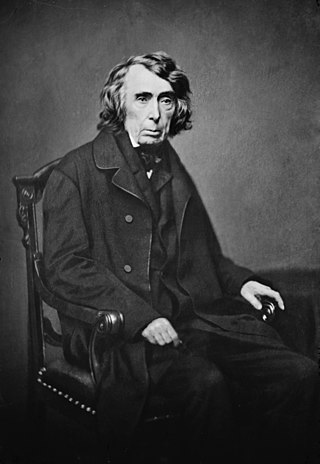
Ex parte Merryman, 17 F. Cas. 144 (No. 9487), was a controversial U.S. federal court case that arose out of the American Civil War. It was a test of the authority of the President to suspend "the privilege of the writ of habeas corpus" under the Constitution's Suspension Clause, when Congress was in recess and therefore unavailable to do so itself. More generally, the case raised questions about the ability of the executive branch to decline to enforce judicial decisions when the executive believes them to be erroneous and harmful to its own legal powers.
Ex parte Milligan, 71 U.S. 2 (1866), is a landmark decision of the U.S. Supreme Court that ruled that the use of military tribunals to try civilians when civil courts are operating is unconstitutional. In this particular case, the Court was unwilling to give former President Abraham Lincoln's administration the power of military commission jurisdiction, part of the administration's controversial plan to deal with Union dissenters during the American Civil War. Justice David Davis, who delivered the majority opinion, stated that "martial rule can never exist when the courts are open" and confined martial law to areas of "military operations, where war really prevails", and when it was a necessity to provide a substitute for a civil authority that had been overthrown. Chief Justice Salmon P. Chase and three associate justices filed a separate opinion concurring with the majority in the judgment, but asserting that Congress had the power to authorize a military commission, although it had not done so in Milligan's case.
In law, a legal person is any person or 'thing' that can do the things a human person is usually able to do in law – such as enter into contracts, sue and be sued, own property, and so on. The reason for the term "legal person" is that some legal persons are not people: companies and corporations are "persons" legally speaking, but they are not people in a literal sense.
Bolling v. Sharpe, 347 U.S. 497 (1954), is a landmark United States Supreme Court case in which the Court held that the Constitution prohibits segregated public schools in the District of Columbia. Originally argued on December 10–11, 1952, a year before Brown v. Board of Education, Bolling was reargued on December 8–9, 1953, and was unanimously decided on May 17, 1954, the same day as Brown. The Bolling decision was supplemented in 1955 with the second Brown opinion, which ordered desegregation "with all deliberate speed". In Bolling, the Court did not address school desegregation in the context of the Fourteenth Amendment's Equal Protection Clause, which applies only to the states, but rather held that school segregation was unconstitutional under the Due Process Clause of the Fifth Amendment to the United States Constitution. The Court observed that the Fifth Amendment to the United States Constitution lacked an Equal Protection Clause, as in the Fourteenth Amendment to the United States Constitution. However, the Court held that the concepts of equal protection and due process are not mutually exclusive, establishing the reverse incorporation doctrine.
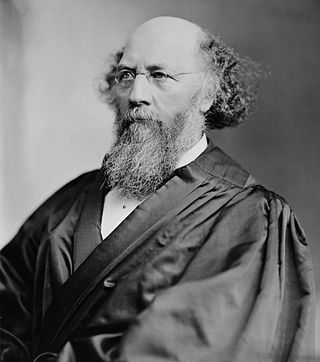
Stephen Johnson Field was an American jurist. He was an Associate Justice of the United States Supreme Court from May 20, 1863, to December 1, 1897, the second longest tenure of any justice. Prior to this appointment, he was the fifth Chief Justice of California.

John Archibald Campbell was an American jurist. He was a successful lawyer in Georgia and Alabama, where he served in the state legislature. Appointed by Franklin Pierce to the United States Supreme Court in 1853, he resigned at the beginning of the American Civil War, traveled south and became an official of the Confederate States of America. After serving six months in a military prison at war's end, he secured a pardon and resumed his law practice in New Orleans, where he also opposed Reconstruction.
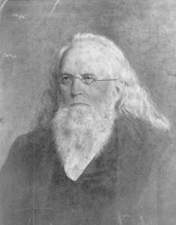
Sidney Breese, a lawyer, soldier, author and jurist born in New York, became an early Illinois pioneer and represented the state in the United States Senate as well as served as Chief Justice of the Illinois Supreme Court and Speaker of the Illinois House of Representatives, and has been called "father of the Illinois Central Railroad".

Abraham Lincoln was born on February 12, 1809, in a one-room log cabin on the Sinking Spring farm, south of Hodgenville in Hardin County, Kentucky. His siblings were Sarah Lincoln Grigsby and Thomas Lincoln, Jr. After a land title dispute forced the family to leave in 1811, they relocated to Knob Creek farm, eight miles to the north. By 1814, Thomas Lincoln, Abraham's father, had lost most of his land in Kentucky in legal disputes over land titles. In 1816, Thomas and Nancy Lincoln, their nine-year-old daughter Sarah, and seven-year-old Abraham moved to what became Indiana, where they settled in Hurricane Township, Perry County, Indiana.

Jonathan Young Scammon was an early settler in Chicago, Illinois, arriving in the city in 1835. He went on to become politically important as a lawyer, banker, and newspaper publisher. His first wife was Mary Ann Haven Dearborn, a niece of General Dearborn, with whom he had four children. His second wife was Maria Gardner Wright.

Leonard Swett was a civil and criminal lawyer who advised and assisted Abraham Lincoln throughout the president's political career.
Hurd v. Rock Island Bridge Company (1857) is an American civil case that allowed railroads to continue to cross the Mississippi River on bridges, over the protests of steamboat enterprises that requested unfettered access to the channel. One of the lawyers for the rail companies, Abraham Lincoln, earned some degree of fame for his victory, which later led to him becoming the President of the United States.

Samuel Drake Lockwood was an Illinois lawyer and politician who served as the state's Attorney General, Secretary of State, Justice of the Illinois Supreme Court and the state's trustee on the board of the Illinois Central Railroad.
Harlington Wood Jr. was an American lawyer, jurist, political figure and an amateur actor. He served as a United States circuit judge of the United States Court of Appeals for the Seventh Circuit from 1976 until his death in 2008, after earlier serving as a United States district judge of the United States District Court for the Southern District of Illinois. He was considered one of the country's leading legal historians on the life and legacy of former lawyer and United States President Abraham Lincoln, but is perhaps best known for his involvement as an Assistant Attorney General for the United States Department of Justice in two separate Native American armed protests: the first being the occupation at Alcatraz Island, in San Francisco Bay, from 1969 through the summer of 1971, and the second being the Wounded Knee incident in 1973 at Wounded Knee, South Dakota. His accomplishments and impact as both jurist and statesman included participation in many recent events around the world, which he circled three times, including Russia, Outer Mongolia, Europe, Cambodia, Greenland, China, Japan and South America.
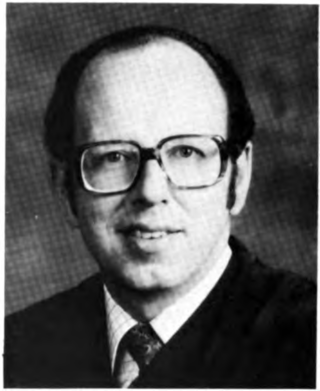
Marvin E. Aspen is a senior United States district judge of the United States District Court for the Northern District of Illinois.
Nance Legins-Costley, born Nance Legins Cox, an African American, was the first slave legally manumitted (freed) by attorney Abraham Lincoln, in 1841, twenty years before the start of the American Civil War.
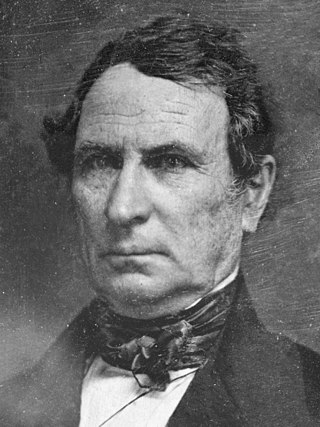
Justin Butterfield served in 1849–1852 as commissioner of the General Land Office of the United States. Appointed to this position in 1849 by the incoming Zachary Taylor administration, he is best known for having faced down, and defeated, another Whig candidate for the same job, Abraham Lincoln. In the General Land Office, he was one of the leading adopters of the railroad land grant system for financing the construction of long-distance railroad infrastructure throughout the United States. He was also one of the foremost Gentile defenders of the rights of the Church of Jesus Christ of Latter Day Saints in Illinois during the final period of Joseph Smith's leadership at Nauvoo.
The Matson Trial (1847), officially Matson v. Ashmore et al. for the use of Bryant, was a freedom suit by former slave Anthony Bryant on behalf of his family in Coles County, Illinois. It is noted for the unusual circumstance where Abraham Lincoln, the future emancipator of slaves, defended a slave-owner against a slave. The case pitted Lincoln and former Illinois Attorney General Usher F. Linder against former US Representative Orlando B. Ficklin. Ficklin's case proved successful, and Bryant's family was emancipated based on free soil doctrine.

James David Zirin is an American lawyer, author, and television talk-show host.











